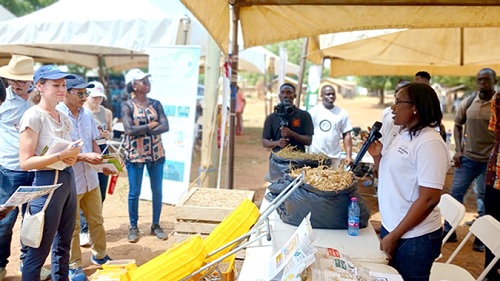
Smallholder farmers in the Kumbungu and Tolon Districts in the Northern Region are recording bumper harvests following the adoption of climate-smart agricultural (CSA) technologies.
This has significantly improved their economic well-being and enhanced food security in the area.
Until recently, farmers in these districts struggled with poor yields due to worsening climatic conditions, including prolonged droughts, erratic rainfall patterns, and climate-induced pest infestations.
However, the narrative has undergone a remarkable shift over the past three years.
A farmer at Gbullung, Mariama Rose, said the introduction of climate-smart practices had transformed her farming activities and enabled her to produce enough food for both household consumption and market sales.
She used to get only three bags per acre, but through the adoption of the best practices, she can harvest about 10 bags per the same plot of land.
Another farmer at Nyankpala, Alhassan Yussif, echoed similar sentiments, noting that the initiative had helped him manage climate stress and improve productivity.
Project
The improvement is largely due to the integration of CSA practices and Climate Information Services (CIS) introduced under the Accelerating Impacts of CGIAR Climate Research for Africa (AICCRA) project through its Smart Production and Soils (SPnS) Bundle project.

A section of the smallholder farmers
The project aims to empower smallholder farmers to adapt to climate stress, conserve soil moisture, and diversify crop production for enhanced food and income security.
With a focus on maize, cowpea, and groundnut, the project has established about six technology parks across five anchor communities.
These serve as platforms for learning, experimentation, and co-innovation among farmers and agricultural stakeholders.
Funded by the World Bank, the AICCRA–SPnS project is implemented in collaboration with the Alliance of Bioversity International and CIAT, CGIAR, Kukubila Nasia Farms Ltd, Eagle Park Innovation Limited, and Farm Radio International.
Impact
More than 6,151 farmers from 18 communities across the Northern, Upper West, and Upper East Regions have adopted climate-smart agriculture (CSA) and climate information services (CIS) best practices under the Accelerating Impacts of CGIAR Climate Research for Africa (AICCRA) project.
Nearly half of these beneficiaries are women and youth, reflecting the project’s commitment to inclusiveness and empowerment of vulnerable groups in agriculture.
In addition, about 1,440 farmers have received hands-on training through the Village-Based Advisors (VBA) approach to strengthen local knowledge sharing and extension support.
Improved productivity
At a community durbar at Gbullung in the Kumbungu District, the Acting District Director of Agriculture, Karim Musah, said the project had positively impacted thousands of farmers by improving productivity and resilience to climate shocks.
He indicated that through the AICCRA–SPnS project, farmers had gained access to timely climate information, improved soil management techniques, and climate-adapted crop varieties.
Mr Musah indicated that the establishment of district-level innovation hubs had positioned Kumbungu as a centre for learning and innovation in climate-smart agriculture across the Northern Region.
For his part, the Director of AICCRA, Dr Robert Zougmore, said the project was being implemented in six countries across Africa, with the overarching goal of increasing access to and use of climate-smart innovations to safeguard livelihoods and protect the environment.
He explained that the project focuses on four priority areas—sharing knowledge, building partnerships, scaling innovations, and fostering gender and social inclusion to create sustainable agricultural systems.
He added that AICCRA’s collaborative approach with national and local partners had strengthened the link between research, policy, and practice, ensuring that farmers benefit directly from scientific innovations.
Satisfaction
A Senior Economist at the World Bank and Team Leader for the project, Viviana Perego, expressed satisfaction with the progress and impact of the initiative in Ghana.
She said the outcomes demonstrate the potential of coordinated climate action in transforming smallholder agriculture.
She added that the World Bank remained committed to supporting programmes that enhance resilience, boost productivity, and promote inclusive growth in Africa’s agricultural sector.
Writer’s email: mohammed.fugu@graphic.com




